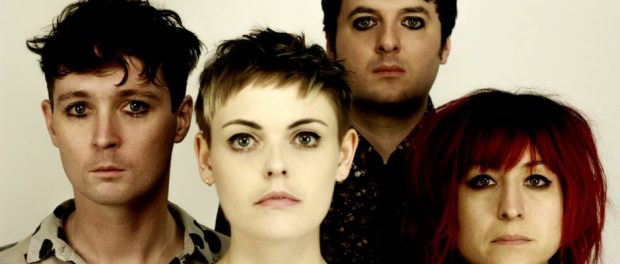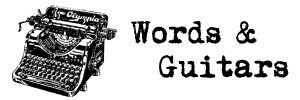Life at the Typeface: Desperate Journalist interviewed

The stock of what we identify as traditional indie rock is not at historically high levels. At least critically, ‘landfill indie’ has become almost synonymous with the genre, so it takes a brave act that will proudly nail its colours to that mast, firing up the chorus pedal and wistfully daydreaming about the days when an NME cover might actually count for something.
We’ve championed Desperate Journalist for a while now, even going so far as to make their debut our ‘Album of the Year’ for 2015. Part of that affection comes from the very resoluteness that fires their muse. There’s nothing nostalgic about the approach, even if they do turn to the standard tools of the trade – a bookish world view, the chime of a Rickenbacker, the solid rhythm section. We still enjoy a well-crafted murder-mystery or western movie – why would indie rock suddenly become redundant? Genre is meaningless: execution is all, and DJ are a thrilling addition to the form.
As the promotion for this year’s Grow Up album (a honing that saw the student disco and radio play as obvious next steps) winds down with a gig at Tufnell Park Dome (19th October) it was time to stop gazing forelornly out the window, and finally get round to transcribing the chat we had with them earlier this year.
===
W&G: Tell me about being a ‘London band.’
Jo Bevan (vocals): As such, there isn’t really a scene for what we do in London. There’s a lot of DIY punk things and Simon runs a night that’s around the glam punk side, but in terms of the indie-ish side of things, it doesn’t feel like there’s as much happening. We don’t feel like we’re part of anything – which is a shame – but on the other hand you do have access to facilities and venues and all that jazz. I guess because we are all from outside of London we don’t necessarily consider ourselves to be a ‘London band.’
So do you feel what you do instead draws on some of that local history?
Rob Hardy (guitars): I don’t feel we’re ‘geographic’ in that sense – not like like Joy Division are Manchester or Suede are London. We just happen to live in London.
Has London lived up to the romantic notions you might have conjoured when you were younger?
Rob: It’s a lot more expensive! I remember when Simon and I moved down from Birmingham, I remember liking it but being… slightly disappointed? The night life didn’t seem as good as Birmingham – it didn’t seem as interesting or crazy. The was obviously so much going on, but it seemed much more divided. There weren’t any clubs – it was all pubs.
Simon Drowner (bass): There were loads of little corners…
Rob: If you wanted to go and listen to one little thing for an entire evening it was OK, whereas in Birmingham you could – at least at that time – go to a club and hear everything.
Jo: I had a different experience because I moved to go to art school in 2004/5 and that was around the time the New Cross, slightly art-y post-punk scene was happening and I was like ‘This is brilliant! This is what I wanted!” That obviously died down and I was ‘OK, it’s just a big city that’s a bit more expensive.’
Caz Helbert: My experience is similar to Jo’s – I came in 2003 and it was really exciting. I came from Paris where there was like one indie club and I arrived in London and I kept these lists – there were three clubs every night apart from a Tuesday. For about two weeks I tried nearly all of them! I formed a band with some friends so all I wanted to do, I managed to do in London!
Rob: It’s also the only place I’ve ever lived where you can wear make up and not get smacked in the face.
It sounds like you maybe moved to the city for different reasons, but at the back of your minds you always wanted to make music.
Jo: I wanted to go to art school because all the bands I liked went to art school. I was very interested in visual art but I knew if I wanted to be in a band like that, I had to go to London.
Do you think it gives you a different perspective? As outsiders, when you take your music to the provinces, you perhaps understand the natural suspicion we have of anything that comes from the capital.
Rob: We understand that these places often have their own scenes, that are often quite closed, but are vibrant in their own right.
Jo: We certainly don’t lord it over anyone else! Hopefully that’s why people have warmed to us.
When did music make a connection with you? You maybe grew up listening and enjoying stuff, but when did the switch flick and you realised this is something you wanted to do?
Rob: I was about five when I started to play piano and from then on it was practically all I ever did.
Jo: I studied singing from a very early age. My mum was musical and she taught me to play acoustic guitar but in terms of listening to pop music, I remember the first time I listened to ‘Waterfront’ by Simple Minds, I thought ‘This sounds like the best gig ever!’ Singing in front of this huge Steve Lillywhite production – I remember my ten year-old self thinking that.
Simon: I was 13 when I learned to play guitar. I didn’t like school that much and music was the one bit I did like.
Caz: I started playing guitar when I was about 14. There was always a piano and a guitar around the house but then I really got into The Cure and Depeche Mode – especially their live videos – and I thought I really want to be on a stage making music and make people feel the way these bands made me feel.
Was that interest something you were able to share with friends or did you disappear into your room…
Jo: I was very much a bedroom listener. I had two or three really close friends and we’d share Wire records because everyone else was into nu-metal and the only act I liked was Deftones because they had that shoegaze element. I definitely had that reputation of being the person who just stayed indoors listening to Radiohead. And not much has changed since!
Simon: I had a few friends who shared the same interests. I was the one who introduced the gang to bands although I don’t think they were as into it as I was.
The album has a thread about coming to terms with adulthood – some might argue playing in a band, enjoying the tremendous trappings of life on the road, is an attempt to extend adolescence.
Rob: There’s a kernel of truth there, but we’ve all got full-time jobs. We’ve got to pay the rent – and this doesn’t pay for it. I see some of the album as about the tension between making music and then having to live another life during the day.
And that’s something that’s changed: bands might not have been wealthy but they were able to do it full-time.
Jo: It’s just harder to go ‘fully band’ because you can’t afford to. I remember reading Bill Drummond’s book The Manual and the first paragraph says you need to be on the dole. That’s just not viable any more.
It requires focus. You can’t spend six months in Barbados over-dubbing guitars.
Simon: It almost adds to the romantic idea of being in a band.
Rob: Everything is planned. It’s why playing live can be sporadic – you’re trying to fit things around work.
Have you had to compromise on things you’d have liked to have done?
Caz: I think we’ve managed it pretty well…
Rob: With touring, it’s made it more difficult. I think if we’d have been able to tour more, things would have moved faster.
With the first album, a lot of the commentary revolved around the vocals or the guitars but ‘Grow Up’ sees the band’s rhythm section come more to the fore.
Rob: Certainly when we recorded some of those first songs, that was when we’d been together just a few months. Caz hadn’t played drums prior to that. I also had this obsessive notion that everything had to sound good when I was sat by myself with a guitar, whereas now I know Caz can play different things and all these different parts can come together as one.
Jo: We now know intuitively know what everyone is good at. It’s easier to write more complex material and we’re much more conscious about what goes where in terms of arrangement.
That will give you a boost going forward.
Caz: There’s a confidence now that we didn’t have to begin with.
Jo: There won’t be a jazz odyssey though.
Rob: I still hold with the three minute pop song!
Thanks for that. I’ll leave you guys alone now.
Jo: I don’t know what we’re going to do. Just stay in the van? There’s beer and snacks.
Seems like you are actually living the dream.
Simon: Yeah! We’ll just stay in the van!
===
Desperate Journalist play Tufnell Park Dome on 19th October and Butlin’s Bognor Regis on 13th January. Keep up to date via their Facebook page.



